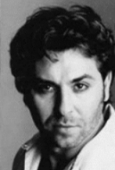
ROBERTO ALAGNA
A BRIEF BIOGRAPHY
by Jean Peccei
Roberto Alagna was born on 7 June 1963 in Clichy-sous-Bois, France, of Sicilian parents who had emigrated to France. He has described his family as "a typical Southern European artistic family consisting of generations of acrobats, mandolin players and singers." His first wife (née Florence Lancien) and mother of his daughter Ornella, died in 1994. He remarried on 26 April 1996 to the soprano Angela Gheorghiu.
Shortly after winning first prize in the Luciano Pavarotti International Competition in Philadelphia in 1988, he made his stage debut as Alfredo in La Traviata with Glyndebourne Touring Opera in Britain. He went on to sing that role in Toulouse, Montpellier, Monte Carlo, Venice, Naples, Messina, and in La Scala Milan where he had a triumphant house debut in 1990.
His roles, especially in the early years, were decidedly in the lyric tenor repertoire Rodolfo in La Boheme, Nemorino in L'Elisir d'amore, Roberto in Roberto Devereux, Rinuccio in Gianni Schicchi, Edgardo in Lucia di Lammermoor, the Duke of Mantua in Rigoletto, Romeo in Gounod's Romeo et Juliette. Since then he has moved into somewhat heavier repertoire adding Don Jose in Carmen, Don Carlo, Cavaradossi in Tosca, Canio in I Pagliacci, and Manrico in Il Trovatore.
Alagna's substantial discography, predominantly with EMI, includes the operas
Rigoletto, Don Carlo, La Rondine, Romeo et Juliette, Werther, La Boheme, Il Trittico, and Tosca released on film and CD in September 2001. Solo recital discs include Sanctus Sacred Songs, French Opera Arias, Serenades,Verdi Arias, and his most recent release, Nessun Dorma. In May 2004, Alagna signed an exclusive contract with Universal Music France, and his future recordings will be released worldwide on Universal's Deutsche Grammophon label. He takes a special interest in filmed opera, with film versions of both Tosca and Romeo et Juliette already released. Future projects include I Pagliacci, Werther, and Cyrano de Bergerac.
Rigoletto, Don Carlo, La Rondine, Romeo et Juliette, Werther, La Boheme, Il Trittico, and Tosca released on film and CD in September 2001. Solo recital discs include Sanctus Sacred Songs, French Opera Arias, Serenades,Verdi Arias, and his most recent release, Nessun Dorma. In May 2004, Alagna signed an exclusive contract with Universal Music France, and his future recordings will be released worldwide on Universal's Deutsche Grammophon label. He takes a special interest in filmed opera, with film versions of both Tosca and Romeo et Juliette already released. Future projects include I Pagliacci, Werther, and Cyrano de Bergerac.
Before his opera career began he sang cabaret in Paris - everything from Jacques Brel to opera arias to 'Hava Nagila'. However, contrary to fancifully embroidered reports in the tabloid press, he was not a 'singing waiter'. Although largely self-taught, he was also a student of Rafael Ruiz and has worked closely with conductor Antonio Pappano whom Alagna described as his 'musical brother'. Recounting a recording session for the sound track of the Tosca film, Anna Picard wrote in BBC Music...
"I see Antonio Pappano persuade Alagna to sing four, simple repeated notes of recitative completely straight like a conventional interjection. Operatic artifice is stripped away and the dialogue between Cavaradossi and the Sacristan comes to life. Later in the same session they work on the final passage of 'Recondita Armonia'. Somewhere around take six, Alagna flips briefly into falsetto, then reclaims the voice at the end of the note - a technique he jokes is the benefit of his years in cabaret. It's magical. Watching Pappano respond to the switch between registers is like watching a blind baseball player catch what should have been a home-run ball."
In 1994 Roberto Alagna was named Personnalité Musicale de l'Année by the French national press, and in April 1995 he received the Laurence Olivier Award for Outstanding Achievement in Opera for his performance in Romeo et Juliette at the Royal Opera House Covent Garden. In 1996 he was made a Chevalier de l'Ordre des Arts et Lettres by the French Ministry of Culture. In 2004 he was named Artiste Lyrique de L'année at the Victoire de la Musique Classique awards.
See also:
Alagna's Discography
Alagna's Schedule of current and future performances
Index of Alagna Press Reviews
Index of Alagna Press Articles
Sources:
Who's Who France
EMI
'Amazing Grace' by Anna Picard, BBC Music Magazine April 2001
www.operabase.com
This page was last updated on: June 13, 2004